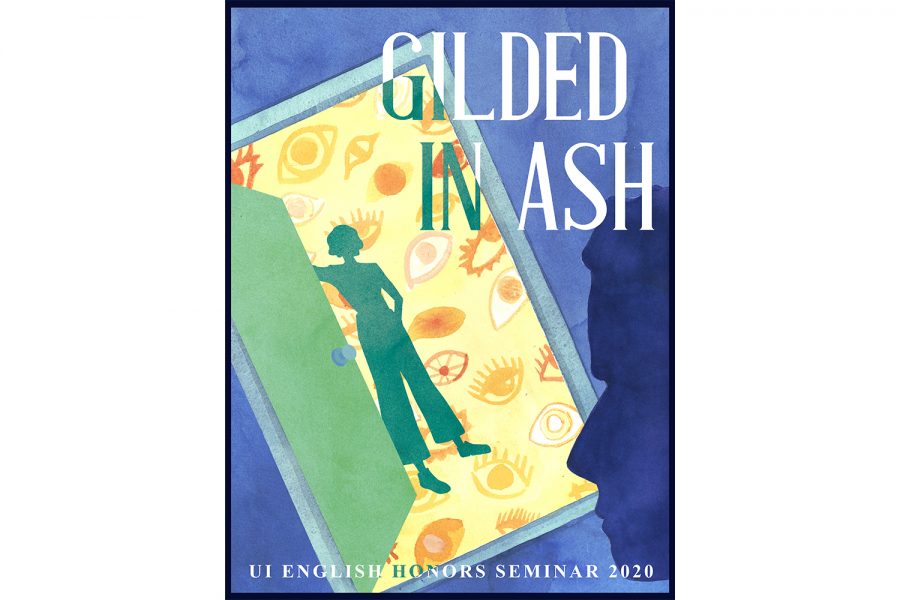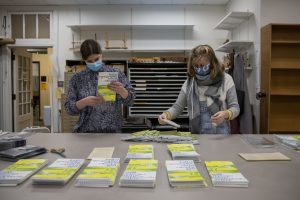UI students rewrite The Great Gatsby through 21st century genre: fanfiction
With its copyright expiring at the end of 2020, one University of Iowa English professor knew that “The Great Gatsby” was situated for a 21st century rewrite. The fanfiction novel, written by UI students, called “Gilded In Ash,” is set to publish in mid-January.
December 15, 2020
Known for its glamorous setup and a troubled character who calls his acquaintances “old sport,” The Great Gatsby recently received a makeover from University of Iowa English and Creative Writing students through a present-day literary format — fanfiction.
Set to publish in mid-January on the UI’s Digital Scholarship and Publishing Studio, “Gilded In Ash,” the nine-chapter fanfiction book, was written by students in the Honors Seminar in Fiction: The Great Gatsby 2.0.
Associate Professor in English Harry Stecopoulos thought of the concept while on a run. He and his colleagues are always thinking of ways to bridge the gap between creative writing and English majors, he said, and that a fanfiction seminar might be a solution.
A Hollywood film producer has already expressed interest in reading the novel and possibly gaining access to its rights, Stecopoulos said, but he declined to share the producer’s name. Though the novel is set to publish digitally, Stecopoulos said he hopes to raise enough funds to publish a hard copy.
The Great Gatsby copyright expires at the curtain call of 2020. Throughout this decade, several other 1920s classics will enter the public domain, including Steamboat Willie, Ernest Hemmingway’s The Sun Also Rises, and George Gershwin’s Rhapsody In Blue.
Stecopoulos knew Gatsby would be the perfect fit for his class. UI students could take the classic novel and write it in a new light, while maintaining a demeanor that is both literary and academic.
RELATED: Midwest authors discuss Midwestern culture in their books at Prairie Lights virtual potluck
“You know they’ve all read The Great Gatsby at least once because you have to in high school,” he said with a laugh. “There’s no escaping high school in the United States without getting through it — I guess you could blow it off — but some of them had read it twice. They’re Gatsby fans. I thought, ‘This is going to work.’”
Definitions of fanfiction range far and wide. Stecopoulos defines it as when people who are passionate about a novel — though it can pertain to other media — write a story so certain plot possibilities can come true. There’s “highbrow” fanfiction, he said, including Jean Rhys’ rewriting Charlottë Bronte’s Jane Eyre as Wide Sargasso Sea. Then there’s user-generated content uploaded to Wattpad, he said, such as fans writing fictitious Harry Potter spinoffs.
The students made several changes to the staples of Gatsby, especially the main character. Jay Gatsby is a young and wealthy white man who came from a poor family in the Midwest in the original novel. In “Gilded In Ash,” Jay Gatsby is an African American lesbian art forger.
Stecopoulos said students knew from the outset that they wanted to write Gatsby as a lesbian woman. Then, Gatsby could take an interest in Daisy Buchanan, the love interest from the 1925 original. After deeming their new novel as “too white,” the students changed Gatsby from a white woman to an African American woman.
“They really thought about it,” Stecopoulos said. “It intersects with some of the reading I’d given them earlier in the semester about the Harlem Renaissance and the Black presence in New York in the ‘20s.”
Rewriting characters in ways that otherwise would not have been represented in the original has been a fun experience for UI senior Haley Triem, who also created the novel’s cover art. As a bisexual woman, Triem said it’s interesting to rewrite characters that fill in representation gaps missed by previous generations.
“It’s cool to have read the original and notice where it lacked and then to try to work with other people to kind of fill in those gaps and write not necessarily a better version, because it’s a really well-written piece of literature, but at least a more representative one,” Triem said.
Several other modifications were made in the story, like how it takes place in 1928-1929 so that the plot coincides with the Stock Market Crash. Eliminating Meyer Wolfsheim, a Jewish character who Fitzgerald wrote with blatant anti-Semitic tropes, is another wise change they made, Stecopoulos added. But the novel’s narrator, character Nick Carraway, remains a constant in both Gatsby pieces.
For UI fourth-year KayLee Kuehl, writing and mimicking F. Scott Fitzgerald’s voice was a strong intellectual exercise. Kuehl said the project helped her think about whether or not she was being too wordy with her prose, and if her wordiness brought a purpose to the overall work.
“It was a really good experience, it was one that I wasn’t expecting to be as influential as it was,” Kuehl said. “But I realize that writing in that way, personally, helped me.”
Even though the book and seminar originally fashioned itself as fanfiction at the semester’s start, most students currently don’t hold this idea to be true anymore; their work has outgrown its genre, Stecopoulos said.
Kuehl said that, while she sees the book as fanfiction, it’s not in the realm of the typical fanfiction that often drags a negative connotation along with it.
“This not only is a very diverse version of The Great Gatsby, it also seeks to heal some of the prejudices that were in the original, some of the problematic things that were in the original,” Kuehl said. “It’s just a strong piece of work — it’s so strong.”
UI senior John Lyons, who helped write the book, said the lines between what is and what isn’t fanfiction are blurred. At the genesis of the semester, the class heavily relied on original source material, and thought about Fitzgerald as an author and of his original characters. As the class progressed into the semester, Lyons said that the “Gatsby” they created did not reflect Fitzgerald’s version of the titular character.
“This story became less and less a story being written in response to Fitzgerald, and more and more our story that had our characters, that now, looking back, feel quite different from the original Fitzgerald,” Lyons said.
Editor’s note: Haley Triem is a former illustrator and reporter for The Daily Iowan

















